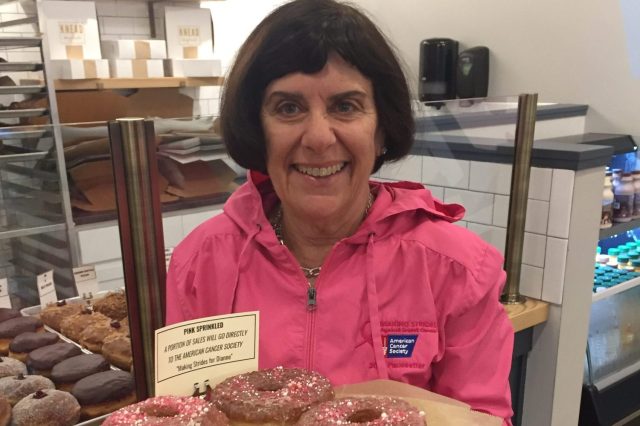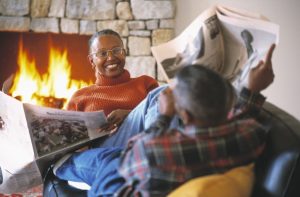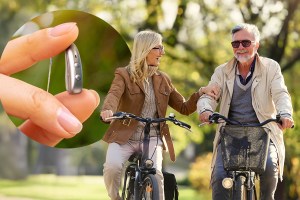While battling a life-changing disease like breast cancer, it helps to have a support system in place. It’s especially helpful when someone who has survived breast cancer is in your corner, helping you navigate through the journey, from the initial diagnosis to undergoing treatment and beyond.
Someone like Dianne Fonseca, a AAA member and resident of Lincoln, R.I., and Palm Aire, Fla., who has been cancer-free for 25 years. The retired teacher recently celebrated her milestone with a Silver Soiree at Kirkbrae Country Club in Lincoln to raise money for the American Cancer Society.
Fonseca hosts an annual breast cancer fundraiser in Rhode Island, but this year was extra special. She is an all-star when it comes to supporting the cause.
She is more than halfway to her ambitious goal of raising $1 million for the American Cancer Society. “If you raise $1 million, you become a legacy team,” Fonseca said. “I want to be a legacy team.”
Fonseca plans to participate in the annual Making Strides Against Breast Cancer Walk on Oct. 20 in Providence with her team, Keeping the Pace With Dianne.
Her friends in Florida have also helped by knitting pink hats and trading them for $100 donations, raising $1,100.
How it Started
Fonseca was diagnosed with breast cancer in 1999. After finding a lump herself, she scheduled an appointment with her doctor, who immediately sent her for a sonogram.
“The hardest part at that time was waiting an entire week for the results,” she said. “I will never forget coming home from teaching that day and finding my husband and older son waiting for me. My husband informed me that my doctor had called him to tell him I had breast cancer. The doctor said the cancer was ugly and aggressive, and there was no cure for me.”
But Fonseca is a fighter and was not going to let her diagnosis get in the way of her life. She and her husband were determined to keep living their lives as they did before. The road ahead wasn’t easy. One of her greatest challenges was losing her hair, which had begun to fall out a week after her first chemotherapy treatment. Fonseca quickly recognized that her diagnosis was strongly affecting her loved ones.
“I was somewhat taken aback at first by the reaction of my husband, our sons and my mom at the news of my breast cancer,” she said. “Our oldest son didn’t want to finish his senior year at Notre Dame, and our youngest didn’t want to go to Loyola University (in Maryland) for his freshman year. I realized that I needed to be strong, not only for myself, but also for my family.”
Fortunately, Fonseca qualified for an experimental drug during her treatment, which put her cancer in remission. “Here I am, 25 years later, due to an experimental drug,” she said. New treatments and protocols have raised the five-year survival rate for breast cancer patients to 91%.
Fonseca found that some of the best medicine was continuing to live her life as she did before her diagnosis. It gave her a purpose and took her mind off her disease.
“It was also better for my family,” she said. “My mom insisted on coming to stay with us when I first came home, but within a couple of days I was up and about, hanging clothes on the line! Always look ahead, and never look back!”
Giving Back
Also critical to Fonseca’s healing was support from volunteers with the American Cancer Society’s Reach to Recovery program. Volunteers who are breast cancer survivors connect with people living with breast cancer. Through in-person visits or by phone, the volunteers provide understanding, comfort and hope by answering questions and addressing concerns that may come up during the experience.
Though they don’t give medical advice, the volunteers offer guidance that only someone who has been through the same experience can. While dealing with her own diagnosis, Fonseca was introduced to a Reach to Recovery volunteer by a friend. Her experience spurred her to help others.
“I knew that as soon as I was able, I would volunteer for the program myself,” Fonseca said.
In 2005, she started providing support to women in southern New England who were facing issues much like those she had during her cancer journey. Many were Spanish-speaking women who understood little English. Fonseca – a former language teacher – speaks Spanish fluently, as well as Italian. She still is registered as a Reach to Recovery volunteer, although she is not as active.
Every year, Fonseca continues to push herself and works to raise more money than the year before. She’s motivated by gratitude for her life and being able to spend time with her husband, two sons, daughters-in-law and five grandchildren.
“In raising these funds, I feel that I am helping the American Cancer Society to continue with their research and programs to help others,” she said. “Volunteering has been the most rewarding for me, helping others who are going through what I went through.”
Another AAA Survivor’s Story
For Mary Maguire, vice president of public and government affairs at AAA Northeast, the cancer story began on Veterans’ Day 2014. Her doctor called while she was driving and told her she had breast cancer. Maguire pulled over and began to cry, because she felt like she had been given a death sentence.
“I’ll never forget what my longtime physician – who had delivered my youngest son – said to me that day. He said, ‘Mary, do you know how many patients I have living with cancer?’ That stuck with me, and today I’m cancer-free and 10 years in remission. And I know many others who are living well, living with cancer or have beaten cancer, like me.”
“My cancer was detected very early and knowing that helped immensely,” she continued. “My doctors were amazing, and my family and friends were incredibly supportive. My colleagues at AAA were concerned and encouraging and provided me with the time I needed to recover.” After six weeks of radiation treatments, Maguire got a clean bill of health.
“My annual mammogram led to my diagnosis,” she added. “Don’t skip or put off your yearly screening – it could save your life!”
Tips for Early Detection
Here are the American Cancer Society’s recommendations for detecting breast cancer early. One of the most important:
Get a Mammogram
Early detection is critical to saving lives.
The American Cancer Society recommends that women between the ages of 40 and 44 have the option to begin annual mammograms. Those between ages 45 and 54 should have mammograms yearly and women 55 and older every two years.
Men can also develop breast cancer, although they represent only about 1% of all cases. Since men are not routinely screened for breast cancer, males, especially those between the ages of 60 and 70, are advised to check for lumps. If they feel anything unusual, they should immediately call their doctor.
Self-Care for Cancer Patients
Fonseca offers her advice and encouragement for those fighting cancer.
Rest Often
“You’re going to be tired. It’s normal,” Fonseca said about having cancer.
People can experience fatigue before, during and after cancer treatment. “Your loved ones will understand if you need to let your body rest. When the opportunity presents itself, take it.”
Look Ahead
“Having a positive outlook changes everything,” according to Fonseca. “Look ahead instead of behind.”
Focusing on the past can dredge up negative emotions, she added. Focus on the future – recovery – and try your best to remain positive. Fonseca said a positive attitude made all the difference during her own experience with cancer.
Take Advantage of Help
Fonseca encourages people with breast cancer to take advantage of all the resources the American Cancer Society offers. In addition to the Reach for Recovery program, the Road to Recovery program provides transportation to cancer-related medical appointments for those who can’t drive. The Look Good, Feel Better program provides group workshops and one-on-one consultations based on skin care, makeup application, hair-loss products and more.
Visit www.cancer.org to learn more.
Do you have any experience volunteering or raising money for a cause that’s important to you? Share your story in the comments below.
Featured image: Knead Donuts of Providence created a doughnut in honor of Dianne Fonseca, and proceeds from the sales went to her making Strides Against Breast Cancer team.














